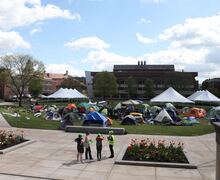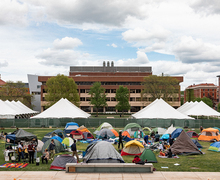Examining DPS’ yearly campus security report
Wendy Wang | Staff Photographer
DPS’s yearly campus security report, mandated by the Jeanne Clery Act, outlined protocols and statistics in the areas of sexual misconduct and drug and alcohol violations.
To support student journalism and the content you love, become a member of The Daily Orange today.
Editor’s Note: This article contains of mentions of sexual assault.
Syracuse University’s Department of Public Safety published its yearly campus security report, DPS Chief Craig Stone announced in a campus-wide email on Friday.
“This report is one of the many ways we communicate with our campus community about crime and fire safety data, crime prevention programs, student safety guidelines, and essential information on campus safety reporting procedures,” Stone wrote.
In 1990, Congress passed the Jeanne Clery Act, which mandates that college and university campuses in the United States report and publish crime data on a yearly basis. This year’s report for SU included policies regarding alcohol, illicit drugs, sexual harassment and fire safety on the university’s main campus and abroad campuses in Italy, England, Spain, Chile, France and China as well as others in the United States.
Sexual misconduct on campus
DPS outlined the 10 steps the university, the department and other agencies will take in the event a student reports a nonconsensual sexual complaint. After a student files, the Title IX coordinator, or another party in extenuating circumstances, will decide if it’s appropriate for the school to process the complaint.
If it can be processed by the university, the coordinator will then reach out to the complainant to discuss possible options and supportive measures. After reaching out, the coordinator will send an official notice to both the complainant and the person who the complaint is against.
DPS stated in the report that “appropriate officials” will then strive to complete an investigation into the allegations in under 90 days. Both parties will then have the opportunity to respond to all the evidence presented by the officials investigating. If the officials find that any party violated SU policy, the university will hold a hearing. SU will then provide all parties the outcome of the hearing simultaneously.
If either party wants to appeal the decision, the university will review changes and then provide a written determination.
DPS also outlined possible sanctions they can use regarding nonconsensual sexual encounters including social probation and expulsion for students as well as suspension with or without pay and the “reassignment of duties” for faculty and staff at SU.

Stephanie Zaso | Design Editor
In the report, DPS included data regarding sexual offenses on campus. From 2019 to 2021, the number of cases of “rape” and “fondling” stayed relatively stagnant, moving from 15 to 14. The number of “Violence Against Women Act” violations jumped over the period, going from 17 total cases of dating violence, domestic violence and stalking in 2019 to 28 in 2021.
According to the university’s 2020 survey on sexual and relationship violence, 95% of students sexually assaulted at SU do not report the assault to the university.
In the report, DPS provided a series of off-campus resources for students such as Vera House, the Syracuse Police Department’s Abused Persons Unit and the New York State Domestic and Sexual Violence Hotline.

Drug and alcohol violations
DPS wrote in the report that the university complies and coordinates with “all applicable local, state, federal laws regarding alcohol and other drugs/controlled substances.” The university will suspend students for the possession of marijuana upon their third violation. Selling marijuana can lead to suspension on a student’s second offense.
Overall, drug violations have gone down over the last few years. In 2019, DPS referred 71 drug law violations and in 2021, the agency registered 26. Liquor law violations also decreased, falling 11.1% from 2019 to 2021.
Under this report, all violations that specify alcohol start off with either a disciplinary warning or disciplinary probation. Both consequences are accompanied by activities such as community service or “educational project(s).”
Illegal drugs outside of marijuana and the misuse of controlled substances are subject to different consequences. The university will suspend a student on their second violation for the use of illegal drugs or “extreme drug intoxication or abuse-related behavior,” the report said. The university will only consider expulsion on the third violation of possessing illegal drugs.
Students can access counseling regarding both drug and alcohol abuse through the Barnes Center at the Arch. The center also offers the Options Education Group, “a single session group that focuses on the impact of substance use on physiology, perception and decision-making,” according to the report.
Published on October 2, 2022 at 11:49 pm
Contact Kyle: [email protected] | @Kyle_Chouinard




